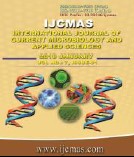


 National Academy of Agricultural Sciences (NAAS)
National Academy of Agricultural Sciences (NAAS)

|
PRINT ISSN : 2319-7692
Online ISSN : 2319-7706 Issues : 12 per year Publisher : Excellent Publishers Email : editorijcmas@gmail.com / submit@ijcmas.com Editor-in-chief: Dr.M.Prakash Index Copernicus ICV 2018: 95.39 NAAS RATING 2020: 5.38 |
Basil (Ocimum canum) is cultivated primarily for the essential oil which is used by cosmetics, confectionary and pharmaceutical industries. The modern day intensive crop cultivation requires extensive use of chemical fertilizers but fertilizers are not only in short supply but they are expensive in developing countries. Therefore the current trend is to explore the possibility of supplementing chemical fertilizers with organic ones, more particularly bio and botanical fertilizers. Biovita is a unique botanical fertilizer extracted from freshly harvested sea-weed Ascophyllum nodosum, nornagian weed. There is a strong need to boost the productivity of this crop. The higher productivity of tulsi can appreciably be achieved through adoption of improved cultural practices. The field experiment was undertaken on var. OC-11 at AICRP, MAP and Betelvine, JNKVV, Jabalpur during 2011-2012 in Randomized Block Design with four replications. Total nine treatments comprising of soil application @ 20 kg/ha, foliar spray 500ml, 625, 725ml ha-1at 25, 45 and 65days after transplanting, respectively. Both Soil+ foliar sprays also tried. The highest plant height, leaf size, stem length, maximum herb yield, highest oil content, highest linalool (%), methyl chavicol (%) and highest gross return was found in biovita @ 20 kg/ha+ 500 ml + 625 ml/ha and minimum values were associated with control.
 |
 |
 |
 |
 |